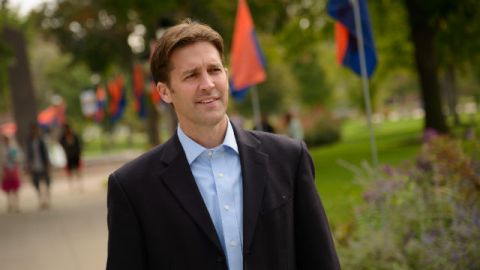How Much Religious Liberty Is Too Much?

For the Republican Senate candidate from Nebraska, Ben Sasse, the answer is clear: there’s no such thing as too much religious freedom. And you might be inclined to agree. Isn’t religious liberty America’s “first freedom,” the right listed first in the First Amendment? Wasn’t freedom of conscience one of the driving forces behind the colonists’ desire to quit England for the New World in the first place?
Yes, of course. Religious freedom is a crucial component of American constitutional liberty. It should be zealously protected. But how zealously, and…how?
For a Ph.D. in History from Yale, Ben Sasse evinces a surprisingly limited capacity for subtlety. On his campaign website, Mr. Sasse’s views are characterized this way:
“Our right to the free exercise of is co-equal to our right to life. This is not a negotiable issue. Government cannot force citizens to violate their religious beliefs under any circumstances. He will fight for the right of all Americans to act in accordance with their conscience.”
Sorry, Ben Sasse, no constitutional right is absolute: “life, liberty and property” can be taken away “with due process of law”; private property can be appropriated from individuals for public purposes as long as “just compensation” is offered in exchange; “equal protection of the law” is everyone’s right…as long as no compelling state interest requires differential treatment.
And despite its caveat-free formulation in the First Amendment (“Congress shall make no law…prohibiting the free exercise [of religion]”), religious liberty is no exception. In an 1878 case in which a Mormon man prosecuted for being married to two women challenged his conviction under a federal anti-polygamy law, the Supreme Court drew a sharp distinction between beliefs and practices flowing from those beliefs. Religious scruples are no automatic excuse for violating the law:
Laws are made for the government of actions, and while they cannot interfere with mere religious belief and opinions, they may with practices. Suppose one believed that human sacrifices were a necessary part of religious worship; would it be seriously contended that the civil government under which he lived could not interfere to prevent a sacrifice? Or if a wife religiously believed it was her duty to burn herself upon the funeral pile of her dead husband; would it be beyond the power of the civil government to prevent her carrying her belief into practice?
The human-sacrifice nightmare scenario is often cited by those who oppose overly solicitous policies toward religious believers, and it’s a tiny bit disingenuous: no religious group has ever put forward a claim that the murder laws infringe on their freedom to worship. But dial back the intensity of the nightmare a few ticks and you’ll come upon some pretty disturbing exemptions from general laws that Mr. Sasse’s uncompromising position would require.
The immediate context here is the “contraceptive mandate” of the Affordable Care Act, the requirement that most employers provide no-cost birth control to their female employees under company health-insurance plans. The Green family, owners of a chain of craft stores called Hobby Lobby, claim that this mandate asks them to violate deeply held beliefs against terminating a fertilized egg; they want to be exempt. But granting the exemption would strip women working for companies like Hobby Lobby of a federal benefit other women enjoy. A ruling in Hobby Lobby’s favor could open the door to untold other exemptions for religious businesses from other federal laws and benefits — everything from Social Security to the Fair Labor Standards Act.
Imagine an employer believed it the duty of men to be breadwinners while women raised children. Should his business be exempted from the Family and Medical Leave Act requirement to provide unpaid child-care leave to a male employee? Ben Sasse, presumably, would say yes. He would also likely endorse the bills being considered in several states to give businesses the right to refuse service to gays and lesbians.
So in claiming, with untenable breadth, that the government “cannot force citizens to violate their religious beliefs under any circumstances,” Ben Sasse pushes other rights and benefits off the shelf to make room for a single enshrined First Amendment freedom. That’s too much religious liberty.
Image credit: Shutterstock.com





